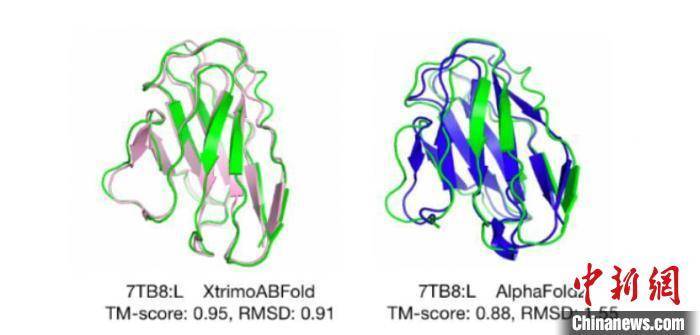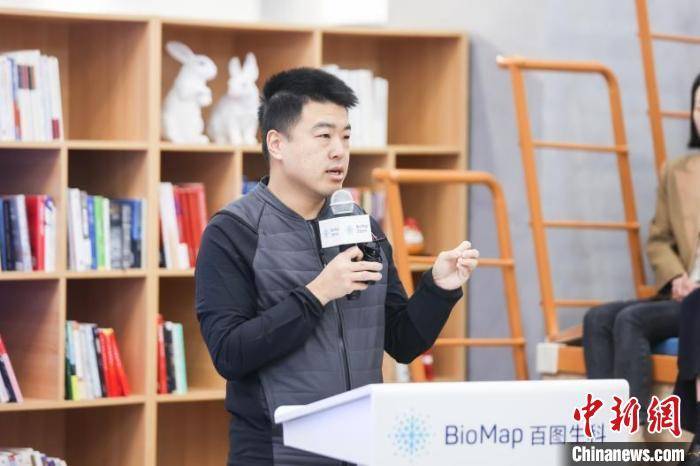

Baitu Biotechnology provides a picture comparing the performance of "AlphaFold2" and "xTrimoABFold" antibody structure prediction
China News Service, Beijing, June 12th, Title: Using AI to explore the "key" to antibodies and accelerate drug research and development - an interview with the Baitu Biotechnology team
Reporter Zhang Su
Just imagine, the proteins present in the human body have various forms of "keyholes". If researchers can accurately predict the forms and design the corresponding "keys", they can greatly improve the "unlocking" efficiency, and this has Help accelerate more cutting-edge drug research and development and other life science projects...
The reporter learned from the interview that the R&D team of Baitu Biotechnology has made a series of positive progress, including the release of the AIGP (AI Generated Protein) platform driven by large life science models.
Collaborative research and development, innovative ideas and methods for drug development
In the recent period, Chen Zibo's laboratory at West Lake University and Baitu Biotech jointly carried out an AND-gate protein design research project based on the AIGP platform. This move aims to design artificial "smart" proteins with molecular logic gate functions to achieve precise signal response and regulation of complex living systems and provide innovative solutions for the diagnosis and treatment of many diseases.
We use the AIGP platform to quickly design and generate proteins with specific properties. This provides a basis for the design and application of AND-gate proteins, and also provides a new way of thinking and methods for the development of innovative drugs. "Liu Wei, CEO of Baitu Biotech, said in an interview.

The picture shows Liu Wei, CEO of Baitu Biotechnology. Photo provided by Baitu Biotechnology
Liu Wei also cited the example of cooperation with Logos Biotechnology to explore new tumor targets, using the self-developed tumor immune escape target identification platform (Tier-A) to quickly transform innovative results into new mechanisms of action. For biological macromolecules, "It usually takes several months to analyze the crystal structure in the laboratory, but the AIGP platform shortens this process to one or two weeks."
According to Song Le, chief technology officer and chief AI scientist of Baitu Biotechnology, target discovery, compound synthesis and screening are key links in the research and development of new drugs, and large AI models are expected to achieve double improvements in the efficiency and effectiveness of the process, " We hope to quickly design a 'key' that meets the 'keyhole' precision in the computer, speed up the evolution of artificially designed proteins, and thus solve the pain points in the life sciences industry."
It is reported that Baitu Biotech will soon disclose part of the user interface of the AIGP platform to potential partners and professional researchers. They plan to launch AIGP 2.0 version within a year to provide more mission model training and other capabilities.
Faster and more accurate, promoting model iteration and application implementation
The AIGP platform with its many highlights relies on the large-scale multi-modal model system "xTrimo".
It is reported that “xTrimo” is composed of a pre-trained model with hundreds of billions of parameters and multiple downstream task models. Its model adopts the design logic of a four-layer nested structure. In April this year, Baitu Biotech released data showing that the antibody structure prediction model "xTrimoABFold" showed higher accuracy and efficiency. Compared with "AlphaFold2", its inference speed is 540 times faster, its running speed is 151 times faster, and it can accurately predict the atomic-level structure of antibodies within 3 seconds.
“The accuracy or quality of data will have a direct impact on model performance.” Song Le said when explaining the reasons for obtaining this “report card”. The R&D team also conducted detailed alignment work on public data and supplemented high-quality data with internal laboratory data to effectively address the challenges of data mining and utilization. The biological supercomputing platform they established before can dynamically obtain thousands to tens of thousands of GPUs and corresponding CPU resources, which is very powerful in terms of computing power.
"xTrimoGene", another sub-model in the "xTrimo" system, and its version "scFoundation" for more downstream tasks have also received widespread attention. Recently, the results of a paper released by Baitu Biotechnology and Tsinghua University show that xTrimoGene and scFoundation outperform classic methods in six basic tasks and downstream application scenarios in the single-cell field, including cell type annotation, perturbation prediction, and synergistic drug combination. Realized industry SOTA.
Our goal is to do the best in basic work and further improve the accuracy and efficiency of the model, including increasing the speed of antibody structure prediction to milliseconds. " Song Le said.
At the same time, Liu Wei said that they also hope to open some capabilities to the industry, recruit more ecological partners, promote the rapid iteration and application of large models, and form a high-quality data closed loop.
Facing the future and creating more and better proteins
First, scientific researchers input various parameter requirements for the target protein, and the algorithm generates the protein. Then, the protein is automatically printed out, and the researchers only need to take the protein automatically produced by the algorithm for further scientific verification... This is Liu Wei's vision for the future "protein factory".
Looking forward to pushing the AIGP platform to a new height through our efforts in the next five years, bringing more beautiful proteins to the world, and contributing to creating a better life. "He said.
Baitu Biotech has launched the "Excellent Developer Program", which is open to cutting-edge biotechnology experts, drug development experts and clinical professional teams, and aims to target the future. Song Le explained that the plan will provide scientific research funding and technical support for high-level translational medical research projects. He said that Baitu Biotechnology has established a team composed of talents with multi-disciplinary backgrounds to ensure that scientific research results continue to be produced.
It should be noted that as the application field of AI protein design continues to expand, the cooperation carried out by relevant parties based on the AIGP platform is not limited to the development of antibody drugs in a narrow sense, but also enters a variety of macromolecule drugs, cell gene therapy, life sciences Tools and other fields, and extends to environmental protection, petroleum, food and other fields, using AI's ability to generate innovative proteins to solve more real-life problems. For example, researchers are studying proteases in an effort to find a way to efficiently break down plastics or speed up preparations for specific energy production.
Liu Wei said that while working hard to expand target areas and business models, they maintain the same original intention, which is to “use AI large models, cutting-edge biocomputing technology, etc. to model complex life forms and design new proteins to meet the challenge.” Despite the huge investment, they will still move forward firmly on this path. (over)
The above is the detailed content of Using AI to explore the 'key” to antibodies and accelerate drug development—an interview with the Baitu Biotechnology team. For more information, please follow other related articles on the PHP Chinese website!
 How to operate Oracle rounding
How to operate Oracle rounding
 How to use frequency function
How to use frequency function
 The difference between win10 home version and professional version
The difference between win10 home version and professional version
 What to do if the chm file cannot be opened
What to do if the chm file cannot be opened
 What are the website building functions?
What are the website building functions?
 What are the differences between Eclipse version numbers?
What are the differences between Eclipse version numbers?
 How to open win11 control panel
How to open win11 control panel
 What does terminal equipment mean?
What does terminal equipment mean?




